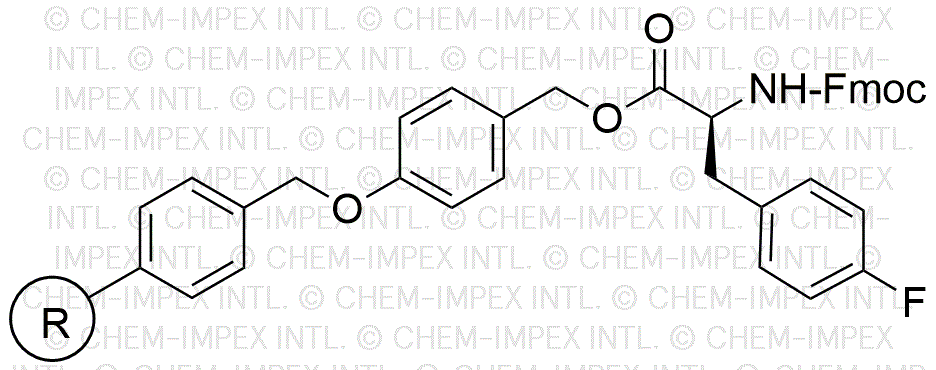Fmoc-4-fluoro-L-phenylalanine 4-alkoxybenzyl alcohol resin is widely utilized in research focused on:
- Peptide Synthesis: This resin is essential for solid-phase peptide synthesis, allowing researchers to create complex peptides efficiently with high purity.
- Drug Development: It plays a crucial role in the development of peptide-based drugs, particularly those targeting specific receptors, enhancing therapeutic efficacy.
- Bioconjugation: The resin facilitates the attachment of peptides to other biomolecules, aiding in the design of targeted delivery systems for pharmaceuticals.
- Protein Engineering: Researchers use this resin to incorporate modified amino acids into proteins, which can improve stability and functionality in various applications.
- Analytical Chemistry: It is valuable in the synthesis of labeled peptides for use in mass spectrometry and other analytical techniques, enhancing detection and analysis capabilities.
General Information
Properties
Safety and Regulations
Applications
Fmoc-4-fluoro-L-phenylalanine 4-alkoxybenzyl alcohol resin is widely utilized in research focused on:
- Peptide Synthesis: This resin is essential for solid-phase peptide synthesis, allowing researchers to create complex peptides efficiently with high purity.
- Drug Development: It plays a crucial role in the development of peptide-based drugs, particularly those targeting specific receptors, enhancing therapeutic efficacy.
- Bioconjugation: The resin facilitates the attachment of peptides to other biomolecules, aiding in the design of targeted delivery systems for pharmaceuticals.
- Protein Engineering: Researchers use this resin to incorporate modified amino acids into proteins, which can improve stability and functionality in various applications.
- Analytical Chemistry: It is valuable in the synthesis of labeled peptides for use in mass spectrometry and other analytical techniques, enhancing detection and analysis capabilities.
Documents
Safety Data Sheets (SDS)
The SDS provides comprehensive safety information on handling, storage, and disposal of the product.
Product Specification (PS)
The PS provides a comprehensive breakdown of the product’s properties, including chemical composition, physical state, purity, and storage requirements. It also details acceptable quality ranges and the product's intended applications.
Certificates of Analysis (COA)
Search for Certificates of Analysis (COA) by entering the products Lot Number. Lot and Batch Numbers can be found on a product’s label following the words ‘Lot’ or ‘Batch’.
*Catalog Number
*Lot Number
Certificates Of Origin (COO)
This COO confirms the country where the product was manufactured, and also details the materials and components used in it and whether it is derived from natural, synthetic, or other specific sources. This certificate may be required for customs, trade, and regulatory compliance.
*Catalog Number
*Lot Number
Safety Data Sheets (SDS)
The SDS provides comprehensive safety information on handling, storage, and disposal of the product.
DownloadProduct Specification (PS)
The PS provides a comprehensive breakdown of the product’s properties, including chemical composition, physical state, purity, and storage requirements. It also details acceptable quality ranges and the product's intended applications.
DownloadCertificates of Analysis (COA)
Search for Certificates of Analysis (COA) by entering the products Lot Number. Lot and Batch Numbers can be found on a product’s label following the words ‘Lot’ or ‘Batch’.
*Catalog Number
*Lot Number
Certificates Of Origin (COO)
This COO confirms the country where the product was manufactured, and also details the materials and components used in it and whether it is derived from natural, synthetic, or other specific sources. This certificate may be required for customs, trade, and regulatory compliance.

